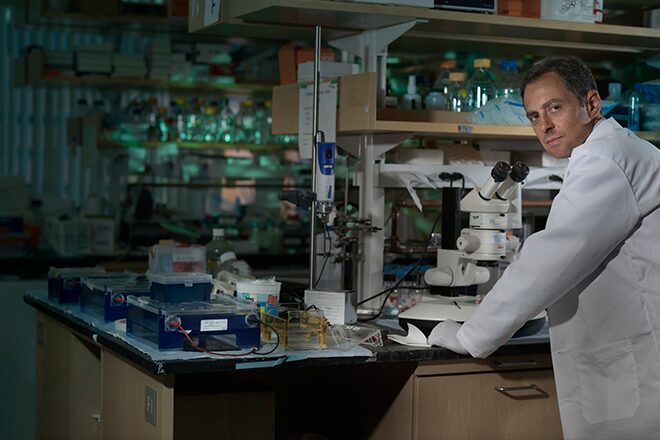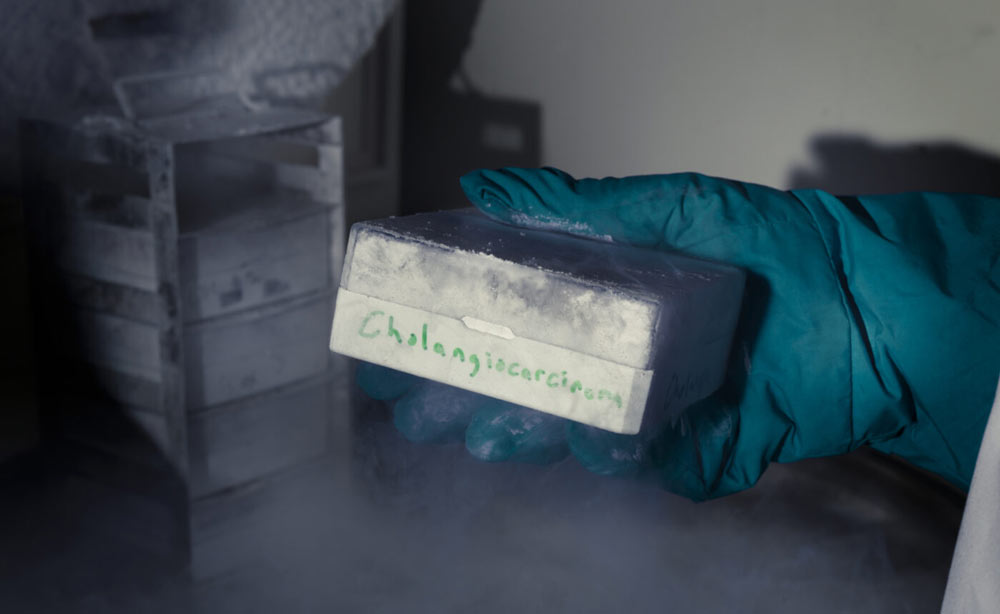
Given our founder Paul Poth’s personal experience with cholangiocarcinoma, advancing the research and treatment options for families facing this challenging rare cancer is a goal that has remained near to our hearts since the earliest days of TargetCancer Foundation.
Since 2011, TargetCancer Foundation (TCF) has invested more than $1.1 million in cholangiocarcinoma research, with a focus on generating basic research tools, understanding driver mutations, and improving treatment options for everyone affected.
The discoveries made as a result of this research are improving outcomes for patients with cholangiocarcinoma and informing discoveries for other rare cancers.

Nabeel Bardeesy, PhD
Gallagher Endowed Chair in Gastrointestinal Cancer Research, Massachusetts General Hospital Cancer Center;
Associate Professor, Harvard Medical School
Support for the Bardeesy Lab
A primary way we have worked to change the research landscape for cholangiocarcinoma is through a long-term commitment to Dr. Nabeel Bardeesy’s lab at the Massachusetts General Hospital Cancer Center. Our strategic seed funding catalyzed rapid research progress in the lab, and the impact for patients has been transformative. In 2014, the first clinical trial informed by TCF-funded research opened, and several subsequent trials have followed, offering patients new opportunities for more effective treatments.
Our funding has helped to establish the key research elements necessary to build a comprehensive research program including:
Cell lines and patient-derived xenografts. The TargetCancer Foundation Cholangiocarcinoma Cell Line Bank was established in 2012 in response to the need for a collection of well-characterized cholangiocarcinoma cell lines and associated xenografts. In 2019, the development of this comprehensive collection was completed, and work to move the collection fully into the public domain was initiated.
Understanding driver mutations. Among other studies, TargetCancer Foundation has supported research into the functions of the IDH1 and IDH2 genes, which are mutated in about 10-15% of intrahepatic cholangiocarcinoma cases. The Bardeesy lab published a groundbreaking paper in Nature (July 2014) on the effects of mutant IDH1/2 in causing cholangiocarcinoma.
Community building. No single lab can take on the tremendous task of studying a rare cancer. Through programs like the TargetCancer Foundation Think Tank on Cholangiocarcinoma, we have helped build a collaborative community of researchers across disease areas. In addition, TargetCancer Foundation has funded cholangiocarcinoma research outside of the Bardeesy Lab in an effort to foster a greater research community. Notably, these initiatives have led to important, cross-institution collaborations that are accelerating progress through coordinated efforts.
Animal models. With our help, the Bardeesy Lab has successfully engineered a series of mouse models and patient-derived xenografts representing several different genetic mutations, allowing for a deeper study of the events driving the development of cholangiocarcinoma in humans.
The Bardeesy Lab has played a key role in advancing understanding and treatment development in cholangiocarcinoma, and we are proud to have been funders and partners in this field-changing research.
First FDA-approved therapies for cholangiocarcinoma
TargetCancer Foundation is honored and proud to have played a role in supporting the work that led to these groundbreaking approvals.
1
Tibsovo (ivosidenib)
The research we supported into the functions of the IDH1 and IDH2 genes and subsequent TCF-supported work at the Bardeesy lab informed the design and interpretation of clinical trials using mutant IDH-inhibiting drugs. In August 2021, Tibsovo (ivosidenib), the first IDH inhibitor for cholangiocarcinoma, was approved by the FDA.
2
Pemazyre (pemigatinib)
Our funding for the Bardeesy lab also focused on supporting research into the role of FGFR2 gene alteration, which appears in about 15% of intrahepatic cholangiocarcinoma cases. FGFR proved to be a key target in cholangiocarcinoma, with the first FGFR inhibitor in cholangiocarcinoma – Pemazyre (pemigatinib) – approved by the FDA in April 2020. Several others soon followed.
But significant work remains.
While approved treatments in IDH and FGFR represent transformative steps in cholangiocarcinoma treatment, significant work remains for patients who develop resistance to these drugs or don’t qualify to use them at all. Subsequent TCF funding has focused on understanding the development of resistance to IDH and FGFR treatments and strategies for integrating immunotherapy into treatment.
Total Grants Awarded: $1,123,000
Primary Grant Recipient
Nabeel Bardeesy, PhD
Massachusetts General Hospital Cancer Center
Additional Grant Recipients
Marina Baretti, MD
Johns Hopkins University
Liron Bar-Peled, PhD
Massachusetts General Hospital Cancer Center
James Cleary, MD and Srivatsan Raghavan, MD, PhD
Dana-Farber Cancer Institute
Andrew Zhu, MD, PhD
Massachusetts General Hospital Cancer Center
Published Research (click to expand)
The below papers were published with support from TargetCancer Foundation.
SULT1A1-dependent sulfonation of alkylators is a lineage-dependent vulnerability of liver cancers
Nature Cancer, March 2023
EGFR inhibition potentiates FGFR inhibitor therapy and overcomes resistance in FGFR2 fusion-positive cholangiocarcinoma
Cancer Discovery, April 2022
Mutant IDH Inhibits IFNγ–TET2 Signaling to Promote Immunoevasion and Tumor Maintenance in Cholangiocarcinoma
Cancer Discovery, March 2022
Biology of IDH mutant cholangiocarcinoma
Hepatology, February 2022
FGFR2 Extracellular Domain In-Frame Deletions Are Therapeutically Targetable Genomic Alterations That Function as Oncogenic Drivers in Cholangiocarcinoma
Cancer Discovery, October 2021
TAS-120 overcomes resistance to ATP-competitive FGFR inhibitors in patients with FGFR2 fusion-positive intrahepatic cholangiocarcinoma
Cancer Discovery, May 2019
Kras and Tp53 Mutations Cause Cholangiocyte- and Hepatocyte-Derived Cholangiocarcinoma
Cancer Research, August 2018
New Horizons for Precision Medicine in Biliary Tract Cancers
Cancer Discovery, September 2017
Polyclonal Secondary FGFR2 Mutations Drive Acquired Resistance to FGFR Inhibition in Patients with FGFR2 Fusion-Positive Cholangiocarcinoma
Cancer Discovery, December 2016
The landscape of targeted therapies for cholangiocarcinoma: current status and emerging targets
Oncotarget, April 2016
Molecular Pathogenesis and Targeted Therapies for Intrahepatic Cholangiocarcinoma
Clinical Cancer Research, January 2016
Isocitrate Dehydrogenase Mutations Confer Dasatinib Hypersensitivity and SRC Dependence in Intrahepatic Cholangiocarcinoma
Cancer Discovery, July 2016
Biliary Tract Cancers: Finding Better Ways to Lump and Split
Journal of Clinical Oncology, August 2015
YAP Inhibition Restores Hepatocyte Differentiation in Advanced HCC, Leading to Tumor Regression
Cell Reports, March 2015
IDH mutations in liver cell plasticity and biliary cancer
Cell Cycle, November 2014
Mutant IDH inhibits HNF-4α to block hepatocyte differentiation and promote biliary cancer
Nature, September 2014
D-2-hydroxyglutarate produced by mutant IDH2 causes cardiomyopathy and neurodegeneration in mice
Genes and Development, March 2014
KrasG12D and p53 Mutation Cause Primary Intrahepatic Cholangiocarcinoma
Cancer Research, January 2012


